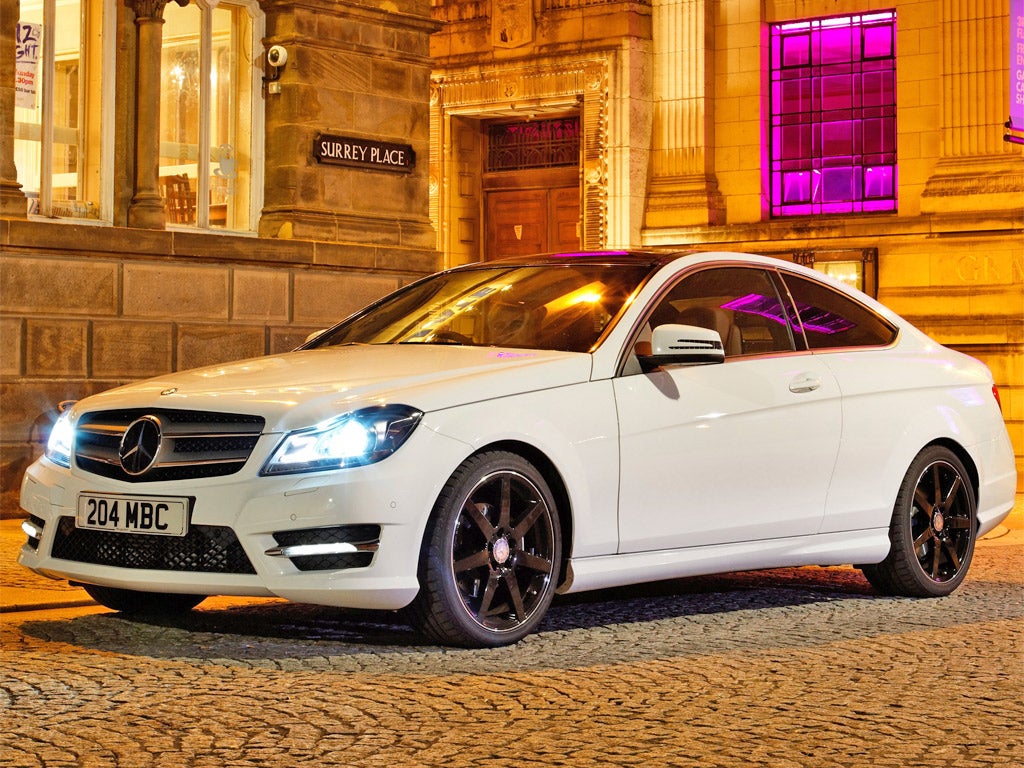Mercedes-Benz C180 Coupé
If 139mph isn't fast enough, then what is?

Price: from £30,090
Engine capacity: 1.6 litres
Power output (BHP @ rpm): 154 @ 5,000
Top speed (mph): 139
0-62mph (seconds): 8.5
Fuel economy (mpg): 44.8
CO2 emissions (g/km): 147
I've always loved Mercedes-Benz saloons and coupés, and unlike some BMWs and Audis they've retained an old-world class and don't all scream excessive consumption with matt paint and red brake-calliper options. Don't get me wrong, they are still cars of gilded privilege, but they offer their effortless power and sumptuous comfort with a touch of class. I even liked the barge-like E-Class models Mercedes knocked out during its ill-fated collaboration with Chrysler in the late 1990s (you can save one from taxi-rank obscurity for less than £1,000 these days), but something odd has happened with the firm's latest entry-level C-Class. Mercedes has caught the engine-downsizing bug and gone and replaced the old model's 1.8-litre petrol engine with a tiny 1.6-litre unit.
To join the club of German luxury-car producers you need to combine power and comfort in the perfect blend and on the face of it Mercedes has ditched the former in the newly refreshed C-Class. Isn't the whole point of a Mercedes or BMW being that you should be able to waft around in comfort and style but occasionally hoof the throttle to overtake with ease? Cue outrage from petrolheads and torque-loving motorists.
First the good news, though. The saloon and coupé (the model I tested) look great, ride calmly over most surfaces, handle well and boast the usual Mercedes-quality cabin. The C-Class isn't, as some people say, the poor man's Mercedes (not many poor men can afford £30,090 for a small family car). Plus its smaller engine, low-resistance tyres and start-stop technology bring CO2 emissions down a fifth from the old model. It's a pseudo-green Mercedes, then, set to challenge BMW's EfficientDynamics brand. Thankfully, though, its designers haven't mucked it up with silly luminous dials or baffling eco-displays so common in many "green" models.
So we can tick the class and comfort boxes in our luxury-car checklist, then, and for a reduced dollop of environmental guilt, but what about power? Despite its smaller engine it keeps the same brake-horsepower figure, but it's not rapid and the 1.6-litre supercharged lump needs a decent number of revs to make progress fast. Take your time, though, and it's a near-silent cruiser on the motorway and covers minor roads with ease, if not verve. And here's the inconvenient truth for speed freaks; despite its "tiny engine for a Mercedes" it will get to 60mph in 8.5 seconds and top out at 139mph. When, though, are these figures remotely relevant or legal? I mean, what kind of world do we live in when 139mph is not fast enough? It is.
By 2018, it's estimated that sales of cars with tiny petrol engines, smaller than 1 litre, will treble in Europe. In other words, petrol is fighting back after having lost ground to diesel in recent years and luxury manufacturers such as Mercedes and BMW don't want to be left behind. They are using every downsizing trick (everything from boosted direct injection and electrohydraulic controls of the inlet valves, in place of a camshaft and the use of two or three turbochargers) to get in on the action. Part of me will be sad to see big, bad petrol engines go but the smaller ones are cleaner, cheaper and fun to drive. And when it comes to engines, less is (now) more.
Join our commenting forum
Join thought-provoking conversations, follow other Independent readers and see their replies
Comments
Bookmark popover
Removed from bookmarks